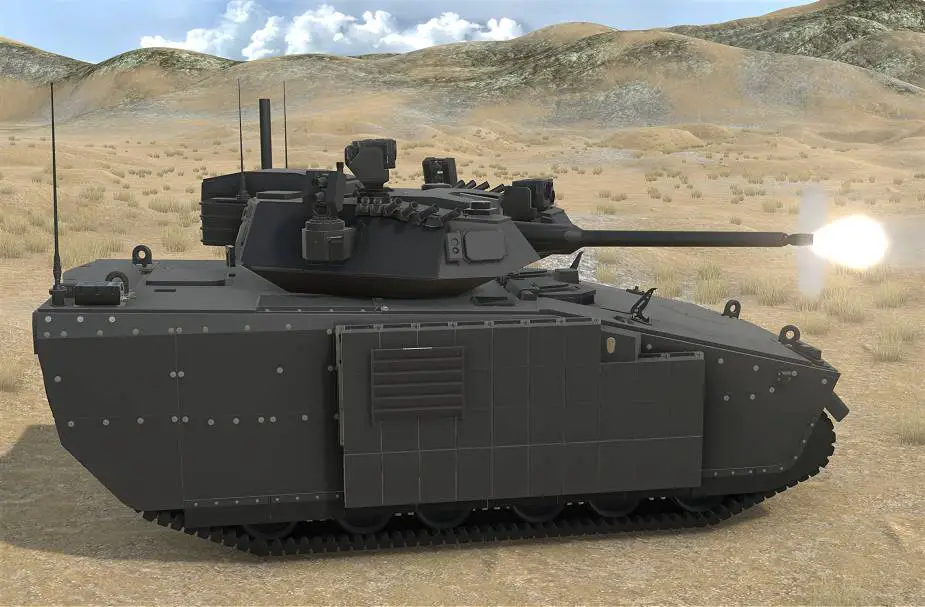Breaking news
BAE Systems partners with 4 US companies for the design of US Army OMFV combat vehicle.
On November 30, 2022, the company BAE Systems announced that he will be teamed with Elbit Systems of America, Curtiss-Wright Corporation, and QinetiQ Limited on its design for the U.S. Army’s Optionally Manned Fighting Vehicle (OMFV) that will replace the Bradley tracked armored IFV (Infantry Fighting Vehicle) currently in service with the U.S. Army.
Follow Army Recognition on Google News at this link

Artist drawing of Optionally Manned Fighting Vehicle OMFV concept.(Picture source BAE Systems)
In June 2018, in part due to congressional concerns, the U.S. Army announced a new modernization strategy and designated the Next Generation Combat Vehicle (NGCV) as the program to replace the M-2 Bradley. In October 2018, U.S. Army leadership decided to re-designate the NGCV as the Optionally Manned Fighting Vehicle (OMFV) and to add additional vehicle programs to what would be called the NGCV Program.
The Bradley is a tracked armored IFV (Infantry Fighting Vehicle) that is in service with the U.S. army since 1981. Despite numerous upgrades over its lifetime, today, the Bradley IFV it does not meet the needs of the US Army in terms of firepower, mobility, and protection and is not able to respond to the new threats of the modern battlefield.
BAE Systems jointly with Elbit Systems of America, Curtiss-Wright Corporation, and QinetiQ Limited will work together to produce an innovative, purpose-built, next-generation combat vehicle designed to meet the U.S. Army’s requirements for an agile, lethal, and survivable solution that will help redefine land combat operations and maneuverability in future conflicts. The proposal was submitted to the U.S. Army earlier this month and today, BAE Systems announced details of how the companies are collaborating.
BAE Systems and Elbit Systems of America are leveraging their extensive experience in the evaluation, demonstration, and validation of next-generation combat systems. For OMFV, Elbit is providing its 50mm Unmanned Turret (UT50), one of the most versatile armament configurations with multiple mission payloads and capabilities, which recently completed a successful live fire demonstration at the Aberdeen Test Center. The UT50 features an XM913 50mm cannon and a high-capacity ammunition handling system.
The OMFV design will use a standardized, Modular Open Systems Architecture (MOSA), designed by BAE Systems and Curtiss-Wright Defense Solutions. MOSA solutions are critical for enabling the customer to rapidly refresh technology to field new capabilities and meet emerging threats on the battlefield. The two companies are also providing vital electronics and control systems into the OMFV.
BAE Systems has invested in and collaborated with the industry for more than 40 years to advance Hybrid Electric Drive (HED) technology. BAE Systems and QinetiQ Limited are developing and integrating the HED technology with an electric cross-drive transmission, a key component of a HED system for tracked combat vehicles, to ensure the OMFV has the speed, reliability, and maneuverability necessary to dominate in the toughest battlefield conditions. QinetiQ Limited’s Modular E-X-Drive® transmission has been tested and proven in a wide range of tracked vehicles and weight classes over the last decade.
“The synergy from our diverse and highly capable team allows us to deliver the next-generation, transformational technology and capabilities our customer is looking for,” said Andy Corea, vice president, and general manager for BAE Systems Combat Mission Systems. “Together we have continually researched, developed, innovated, and delivered and we believe this team can provide a purpose-built vehicle with the winning solutions for future battlefields and, most importantly, for the men and women who put their lives on the line for us each and every day.”
BAE Systems already has the expertise, infrastructure, and resources to deliver results for the U.S. Army’s OMFV platform, with plans to complete project elements at facilities across the U.S. that contribute a diverse set of workforce talent and manufacturing quality.


























